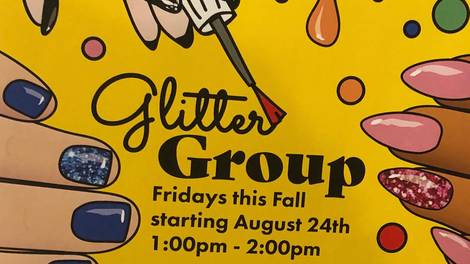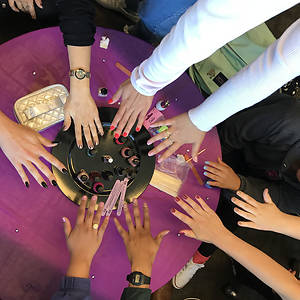
Otoño / Fall 2018
A Little Glitter Goes a Long Way: Safe Queer Spaces and Activism at USF

Part I: Contextualizing LGBTQIA Erasure by Jessica Hyman
This past October, a leaked memo from the Trump administration suggested a move towards strictly defining sex as male or female as determined by genitalia at birth. This legal erasure would pull back recent policy and protections for the Transgender community and has spurred fear amongst the entire LGBTQIA population of the United States. But this is not the first time the Trump administration has threatened transgender members of the LGBTQIA community. According to transequality.org on February 22, 2017, “[t]he Departments of Justice and Education withdrew landmark 2016 guidance explaining how schools must protect transgender students under the federal Title IX law.” This has instrumental implications and further illustrates the needs for schools to fight to protect their transgender and gender non-conforming students. More recently on March 23, 2018, “[t]he Trump Administration announced an implementation plan for its discriminatory ban on transgender military service members,” with more discriminatory bans and policy expected in the near future. This leaves members of this vulnerable community facing a constant fear that their rights may not be upheld or respected, legally or socially.
Luckily, bubbles exist in cities such as San Francisco, where local and state laws, as well as school initiatives aim to protect these communities. For example, the fact that San Francisco includes gender identity as a protected class, and has done so since 1995 is significant. San Francisco's history as a hotspot for LGBTQIA activism makes this city unique. With this new wave of policies aimed at erasing the transgender community, cities, schools, and universities are faced with the task of supporting and protecting these students. This can mean creating physical spaces such as new locker rooms and restrooms, as well as crafting spaces of inclusion and acceptance on campuses. USF is lucky to have the Cultural Centers on campus, which “serves as both physical spaces on campus where students build community, and as outlets for student-run programs that explore social issues and identity.” The Cultural Centers at USF includes the Gender & Sexuality Center and the Intercultural Center where students are able to further explore what makes them unique and find support among their peers. With this hostile presidential administration, how important is it to craft spaces for the LGBTQIA community at USF? And what exactly does USF do to foster community and safety for the LGBTQIA community? While safe spaces exist on campus that offer students support, students themselves are often forced to forge places for themselves as well. In light of the leaked memo it was inspiring to see students post on social media, offer their homes as safe spaces to talk, and open up their hearts to support members of the LGBTQIA community. We also heard from student activists and leaders on campus.
One example is Student Body President, Sage Hapke, who insisted that USF would continue to be a safe space for the LGBTQIA community, a community that makes up 22.5 percent of our student population. Sage clarified that USF and student body organizations would continue to strive for a more equitable and tolerant campus in light of the discriminatory memo. It was powerful to hear that nearly a quarter of our student body population identifies along the LGBTQIA spectrum, which throws light on the urgent need to support this student population. In order to learn more, Katherine Frees sat down with Toni Adeyemi, Senior International Studies major and Film Studies minor, who acts as the Diversity Education Intern for the Gender and Sexuality Center to gauge the work USF and its students have done to create spaces on campus to support members of the LGBTQIA community.
Part II: Glitter Group, A Space of Inclusion by Katherine Frees
While speaking to Toni Adeyemi from the Glitter Group on campus, she explained how USF students are tackling issues such as gender, race, and self-care in student-led groups. The Glitter Group is a open and non-judgmental space for students to talk about big political and social issues, in a safe, comfortable atmosphere. It is a safe haven during a scary political climate in the United States. In this space everyone is welcome to come, chat, and have fun, while painting their nails and enjoying each other’s company. Toni explains that painting nails is a way for people to get together in a space outside of class, that doesn’t involve homework and studying. Painting their nails is a form of fun self-care for students in the Glitter Group.

Toni uses words like “cathartic” when speaking of her time in the Glitter Group. This group has become a place to create an environment of inclusion where students can take their minds off of the stresses of life and have critical conversations. The group combines joy critical discussions on topics such as gender expression and marginalization. Painting your nails and criticizing the gender binary offers an inviting and accessible way for students to learn more about gender, the LGBTQIA community and issues around social justice.
One of the many impactful points from our conversation was Toni’s role as a cis-woman in an LGBTQIA space. Being a cis-woman, a female identified with their gender assignation at birth, Toni has had to understand her privilege in comparison to the difficulty of identifying as transgender or non binary in our society. “I think as cis-women we can typically leave our transgender and non binary people out a lot and talk about how trivial it is to be a cis-woman. So that was my beginning struggle for me.” Hearing this was both comforting and enlightening. As a cis-woman, spaces that discuss gender identity can sometimes be daunting, as Toni also noted, but understanding our privilege and position in society is the first step in being more inclusive.
Toni also gave some insight into some of the topics discussed in the group. She mentions gender expression, a hard-to-grasp concept, “we discuss topics like gender expression, and identity. Also gender expression and anger, like, do you feel like you’ve been allowed to express your anger?” Questions like these allow for USF to have a place on campus where students of all identities feel heard and included.
When we discussed USFCA’s support for the LGBTQIA community, the unanimous answer was no, there is a lack of real support. Toni mentioned USFCA’s new bathrooms in the gym, but she notes that “I think USF can do more for gender nonconforming students, especially about housing. Housing is an issue for nonconforming students.” Discussing issues like housing for gender nonconforming students, further shows the work the Glitter Group does, especially since it also educates others about the specific needs of gender nonconforming and queer students. Issues like housing, tuition, and inclusion don’t have to go undiscussed among students, but spaces like the Glitter Group allow a safe haven for expression; a place to air concerns and be heard from the perspective and experience of LGBTQIA students.
I learned so much from this conversation with a student-activist who was willing to teach me about concepts that I was scared to discuss before. The Glitter Group highlights places on campus for students to learn the way to discuss the LGBTQIA community and have fun doing it. Toni speaks of student activism as a way to express yourself, and to start, one should just “find their voice and what they are passionate about…”
The Glitter Group has given the students at USFCA a space to come, enjoy themselves, and talk about the issues that are the most important to them. In providing a space for students to discuss topics like gender expression and identity, the Glitter Group is much more than a space to be creative through painting your nails. This group is a space of inclusion, acceptance, and empowerment. If I learned one thing through speaking to Toni about these pressing issues, it’s to stop by The Glitter Group whenever you have a moment to unwind and begin destroying the patriarchy. It brings together self-care, fun, and critical discussions at a time when this presidential administration is trying to take away the rights and accomplishments of the gender activists and the LGBTQIA movement.
